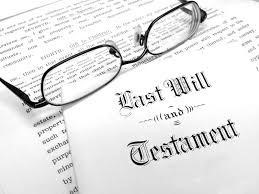 ATC
ATC
WHAT IS A WILL?
A Will is a document that you (the testator) prepare which says what you want done with your property, possessions, belongings (called your "estate") after you die. It also names the person who you want to carry out the terms of your Will (called your "executor"). A Will is important because it simplifies matters upon your death and makes sure that your property passes to those people that you want to get it.
Why should I have a Will?
So that you can decide who your beneficiaries and the executor of your estate should be after you have passed away. It will also place you in a position to appoint a guardian of your choice to take care of your children and/or dependents.
Why do many people still die intestate?
Inviting trouble
Good understanding among children
Property is not valuable enough
There is not enough time for drawing up a Will
Creates rift in the family
Simply ignorant or negligent
KINDS OF WILLS
Handwritten Will
Typed Will
Steps involved in making a will:
It must be in writing
It must be signed by the testator (the owner/maker of the will)
The testator must be of a sound mind at the time of making the will
For the will to be valid in Nigeria, it must be signed by the maker in the presence of at least two witnesses
It must be executed duly in accordance with the law
GAINING ACCESS TO THE BENEFITS OF THE WILL
Where there is a valid “will”
Step by step guide on obtaining a “Probate”;
Search and request for “will”
Presentation, unsealing and reading of “will”
Application for grant of probate
Grant of Probate
Where there is no valid “will”
Step by step guide on obtaining “Letter of Administration”;
Application for letter of administration.
Publication of application in newspaper.
Grant of Letter of Administration
Persons entitled to Letters of Administration
Husband or wife of deceased
Children of the deceased or grand-children of deceased whose parent died during the life time of the deceased.
Father or mother of the deceased.
Brothers or sisters of the deceased of full blood and the children of such brothers or sisters who died during the lifetime of the deceased.
Brothers or sisters of half-blood of the deceased or the children of any such half brother or sister who died during the lifetime of the deceased.
Grandfather or grandmother of the deceased. Uncles and aunts of full blood or their children Creditors of the deceased.
Administrator-General
The above list is arranged according to order of priority; meaning that a father/mother cannot be appointed as administrator where there are capable and willing children but children will not be appointed where there is a willing and capable husband/wife. Court will not appoint a person less than 18 years unless there are two (2) other administrators with such a person.
WHAT IS A TRUST?
Trust is a legal arrangement that allows you to transfer the management of your assets to another person or entity (called a Trustee) for the benefit of another person (s).
Trustees are typically appointed persons such as individuals, Trustee Companies, Banks, Law firms or other corporates. Trustees are granted the legal title to the assets and properties to enable them manage the Trust Deed
A Trust ensures the smooth distribution of your assets to your chosen beneficiaries during and after your lifetime. A Trust created during your lifetime is known as a Living Trust
Benefits of a Trust include:
Easy transfer of wealth to beneficiaries
Prevents disputes amongst family and heirs as the Trust takes effect while you are alive
Avoid delays as in Will administration and probate. Probate process is not necessary for Trust
Ensure control over your assets in the manner desired
Tax efficient
Can be made revocable or irrevocable
A professional can be appointed to manage the Trust for the beneficiaries. The Trust Deed is legally binding
Safety and security – since your property is held in Trust for the beneficiaries, it protects assets against creditors and spendthrifts
Should you make a Will or a Living Trust? What should you consider?
There are many positive reasons to establish a trust but do not overlook the fact that it will involve more upfront effort and expense. To determine if you should make the extra effort and invest in the expense of a trust, consider the following:
Wills and Trusts are both estate planning documents used to pass assets on to beneficiaries at death. However, there are distinct advantages to using a Trust over a Will. Here are a few ways in which a Trust is better than a Will to pass your estate to your beneficiaries.
A trust can be used to avoid Probate and thereby avoid delays, a Will cannot
A Trust can provide Creditor Protection for the Inheritance you leave to Beneficiaries – A will cannot.
A trust can reduce Estate Taxes but a traditional Will cannot
A trust can Administer Assets for Minor Beneficiaries without Court Intervention but a Will cannot
Questions to ask a friend or family member you want as your Executor or Trustee
How do you handle your own finances?
Are you sure you have the time for this? It’s okay if you don’t
Do you think you’ll be available to do this 10 or 20 year from now?
Would you cut off my spouse’s money if you learned she had started seeing someone else after I died?
Would you change my investment portfolio after I die?

